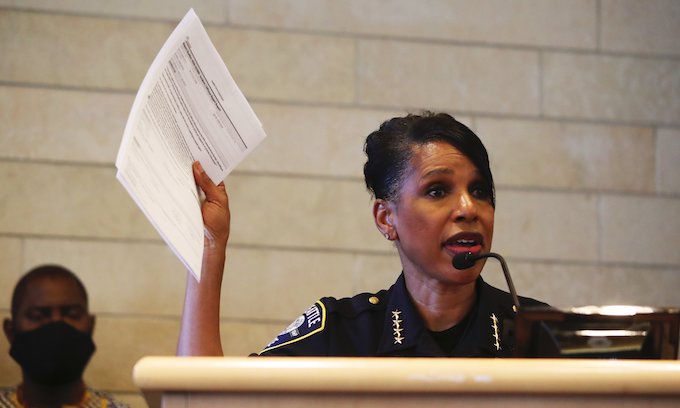The day Carmen Best announced she would be stepping down as Seattle police chief, Victoria Beach talked to a real-estate agent.
Beach, chair of the Seattle Police Department’s African American Community Advisory Council, grew up in Seattle and has lived 40 years on the same block in the Central District. Now, she said, she’s ready to leave.
“I don’t want to be a part of this city.”
Like many Black Seattleites, Beach is livid about how the city treated its first Black police chief, who said she was not consulted as the City Council cut the police department budget, including Best’s salary. Beach also believes the chief was hamstrung in her handling of the former occupied zone known as CHOP or CHAZ by a mayor who was calling the shots.
“It’s a new way of racism,” Beach said of city officials. It entails making a job so hard “that we walk away.”
But Beach’s rift with Seattle is about more than that. Living blocks away from the occupied zone, she didn’t like what she saw: marchers with sledgehammers, spray paint everywhere, destructive white protesters who seemed to be hijacking the movement, violence that claimed the lives of two young Black men.
She favors police reform and reallocating money from law enforcement to social services, but not by nearly as much as some protesters want and the city may be inclined to do. Believing the number of officers will be slashed, she said: “I’m fearful. I feel like now I need to arm myself. So many of my friends are saying that.”
Beach by no means speaks for Black Seattleites, and she knows it. “We’re so divided,” she said, especially along generational lines.
That’s why, amid the shock of the chief’s departure, some are asking how widely the city has sought input among African Americans. Another big question: As the city answers protesters’ call to defund the police department, does it have a plan?
A coalition of activists and community groups wants police funding cut by at least 50%, immediately. Others, including African American clergy and small business owners, are still sorting through what a re-imagining of public safety might look like — and want city officials to take their time with the matter, too.
“They don’t bring enough people to the table who actually are going to be affected by the conversations they’re having,” said Nicole Bascomb, the 44-year-old owner of a real estate company that does business in Seattle and around the region. In 1988, a Seattle police officer fatally shot Bascomb’s uncle, Erdman Bascomb, who was on a couch with a remote control in his hand that the officer said he thought was a gun.
Racism, she points out, “took hundreds of years. You’re not going to fix it in a few weeks by mandating some changes because you want to say you did something. I would rather you be thoughtful about your approach.”
“If she was a white person…”
Bascomb father, Paul Bascomb, got involved with police issues after his brother was killed, and introduced Best to his family as she was rising through the ranks.
Best struck Bascomb, then in her 20s, as someone trustworthy, who lived her values and heard everyone’s voice. “And that’s not always been the case,” Bascomb said of police.
“Did I agree with her policing policy all the time? No.”
Bascomb, who now lives in Kent, said police have been unnecessarily aggressive toward protesters in recent months. “The agitators, whatever they get, they get,” she said. But people shouldn’t be tear-gassed and hit with crowd-control weapons just for protesting.
Her bottom line on the chief leaving, though, is shared by many: “If she was a white person, it wouldn’t have happened that way.”
Bascomb noted, in particular, the council’s squeezing of the police budget by targeting, in part, Best’s salary. Now that Bruce Harrell is no longer on the council, she added: “We don’t have a voice anymore.”
Best did not use her voice, at first, to advocate dramatic change. She talked carefully about institutional racism as a societal problem, not one specifically plaguing police. As the marches went on, the chief said she had an epiphany that this was a pivotal moment that would change policing forever. But she was still fiercely loyal to her officers, many of whom loved her.
“She didn’t really pick a side,” said Dominique Davis, founder and CEO of Community Passageways, an organization that works with youth and seeks alternatives to the criminal justice system. “She straddled the fence.”
As a Black woman, Best couldn’t become part of the system and then turn around and denounce it, reasoned Ashleigh McCurdy, a 32 year-old Hillman City resident who runs an interior design firm. “Then she’ll be viewed as an angry Black woman or a woman with an issue.”
Best appeared upbeat as she thanked supporters and talked about taking time for herself after retiring next month. The chief, McCurdy suspects, wanted “to keep some dignity or some grace that she has left.”
Best, installed as chief in 2018 after African American leaders excoriated the mayor for overlooking her, was a figure of pride. “Just her presence was an inspiration,” McCurdy said.
With the perception that Best was forced out, who will want to step into the role of chief, asked the Rev. Jermell Witherspoon, pastor of two churches, including the Liberation United Church of Christ in Madrona. “Will a person of color even want to deal with that?”
Who creates a plan?
Davis, of Community Passageways, is also looking ahead, at larger issues around policing. An organizer of a large June march in the South End, the 52-year-old supports police defunding.
He said cuts are likely to affect communities of color the most. Police are not going to stop protecting Queen Anne or Magnolia.
He’s ready to help fill the vacuum, though, and is not bemoaning the lack of an official plan.
“It’s up to the community to put that plan in play,” Davis said. “We can’t keep relying on the government … to tell us what we need to do for our own safety.”
“When I started hearing about cuts, I started putting plans together,” Davis said. Community Passageways and a few other organizations submitted a proposal to the City Council to set up safety teams in areas of central and South Seattle where violence has been a problem.
The teams would expand upon the work of Safe Passage, a Rainier Beach-based program that sends staffers trained in de-escalation around the neighborhood. In the past few months, Davis and staffers have been going out at 1 or 2 a.m. when a shooting occurs, he said, to defuse tensions and help those affected navigate the aftermath.
The City Council this month allocated $4 million for a partnership of organizations, including Community Passageways, to work on violence intervention and prevention. The council is using a variety of funds, as well as about $3 million taken from the police department, to put more money into community-based public safety programs.
McCurdy, the interior designer, said she appreciates the defunding push, and believes the law enforcement system was built to oppress Black people. Driving around the Rainier Valley, she said, she frequently sees as many as five police cars responding to a minor incident. “That’s ridiculous to me,” and a waste of resources, she said.
She’s heard the notion at rallies that the community should design an alternative system. For lasting change, she said, “I feel like it needs to be a partnership” between the community and the City Council. If it’s one or the other, it will feel “almost like a dictatorship.”
Also, if the community alone devises a plan and it fails, McCurdy said, the response could be: “Well, we gave you funds and this is what you did with it.”
Of course, city officials need to set policy, Bascomb said. “The City Council is not being dismantled.”
At a Friday news conference held via Zoom by King County Equity Now and Decriminalize Seattle, coalitions leading the call for axing the police budget by half, organizer Nikkita Oliver invited the mayor and City Council to “join us on the right side of history.” She and other leaders made clear, though, that city officials should follow the lead of Black and brown people most affected by police violence and systemic racism.
Oliver, co-executive director of Creative Justice, an arts-based program that works with youth, has called for abolishing police altogether. She stressed at the news conference that “this whole system is rotten” and needs to be replaced with one that can prevent crime, rather than respond to it in harmful ways.
Other leaders said they were embarking on community research to hear ideas for fleshing out a blueprint for police disinvestment and community reinvestment the coalitions submitted to the City Council. The council has said the blueprint will guide a soon-to-be-created civilian-led Department of Community Safety & Violence Prevention.
And if some people of color disagree with the overarching principle of 50% defunding? Sean Goode, a speaker at the news conference and executive director of CHOOSE 180, which works to keep youth out of the criminal justice system, said he initially questioned that goal himself.
“Have all the details been worked out? No, of course not,” Goode said.
But at the end of the day, he said, people of color have to decide whom they align with: members of a system hurting those who look like them or advocates for change.
Bishop Garry Tyson of Goodwill Missionary Baptist Church in the Central District doesn’t see it as an either/or proposition. His family has had frightening encounters with police. Some years ago, he came out of a bookstore to find officers, investigating a bank robbery, pointing a rifle at his 13- and 14-year-old children, who had been waiting in the car.
Police need to support the African American community, he said. At the same time, he said, “I think there are some great police officers in Seattle that need to be supported,” by city officials, their police chief and the community. “We got to figure that out in Seattle and see what that looks like.”
“When I need the police, I need the police,” Tyson added. He pointed to a 2012 road rage encounter with a man who shot him in the hand.
“There’s a reason for police,” agreed Angelia Hicks-Maxie, a Seattle child care provider whose teenage son once had a gun held to his head by home invaders. “We just don’t want you to put your knee on our necks and kill us.”
Despite allegations of police abuse during protests, Hicks-Maxie said she’s seen some officers show tremendous poise as they were cursed and spit at. One day, she hand-delivered three dozen Trophy cupcakes to her local precinct.
Unhappy with young activists she feels are creating a “mob mentality,” furious with City Council members she feels ousted Best, yet fully wanting to reimagine policing, the 56-year-old Hicks-Maxie said she’s realized something. “Some of us who have been sitting on the sidelines, we probably need to jump into the fray.”
___
(c)2020 The Seattle Times
Visit The Seattle Times at www.seattletimes.com
Distributed by Tribune Content Agency, LLC.
—-
This content is published through a licensing agreement with Acquire Media using its NewsEdge technology.



















Recent Comments